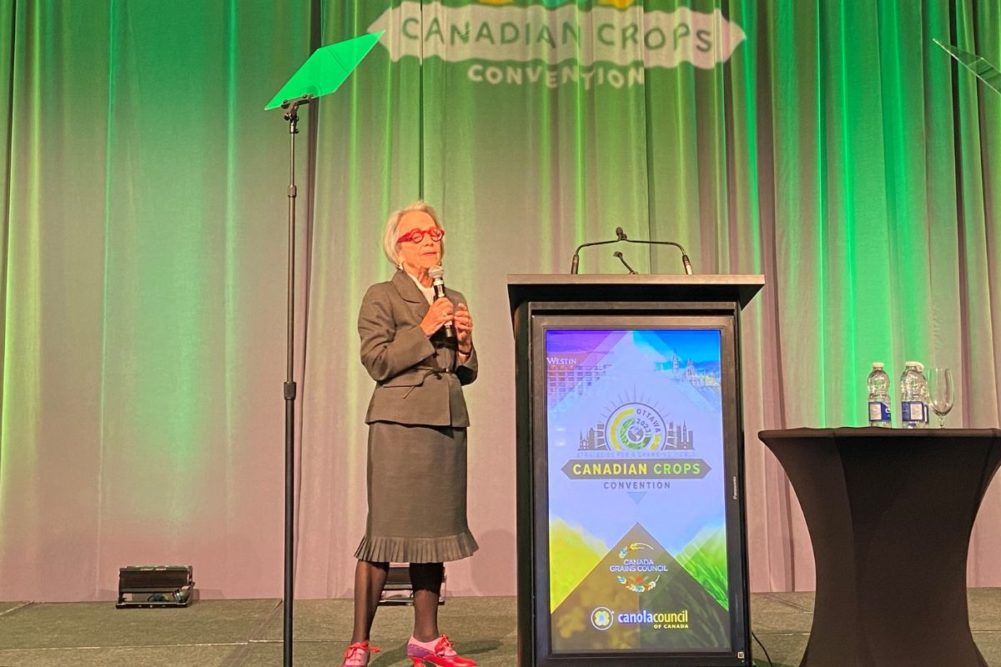OTTAWA, ONTARIO, CANADA — The global agriculture industry is facing at least a decade of turbulence as the world figures out how to deal with each other and compete in ways where there are some rules, Janice Gross Stein said during the Canadian Crops Convention.
“I am a long-term optimist who’s predicting a lot of turbulence over the next few years,” said Stein, who is founding director of the Munk School of Global Affairs and Public Policy, University of Toronto. “We have to prepare for those 10 years.”
The Canadian Crops Convention is hosting its first in-person event since 2020 in Ottawa, Ontario, Canada, with the theme of “Strategies for a Changing World.”
Stein said some of the reasons for her outlook include a drop in global trade coupled with increased protectionism. Globalization — that process of connecting markets through trade and investment — has stalled, she said.
The world is past the period of the 1990s and early 2000s that Stein called “globalization on steroids.” Markets functioned with the greatest autonomy that was ever seen in modern history. China opened up its markets and was in a period of its own development and anxious to access better technology.
“That period is finished,” Stein said. “We are in a new period where the big powers who set the framework will use markets for strategic purposes.”
Protectionism is on the rise, even in the United States under President Joe Biden’s administration, she said. When Biden was elected, people thought things would “go back to normal.”
“Joe Biden’s administration has been the most protectionist administration in the last 30 to 40 years,” Stein said. “This is no small challenge for all of you in this room. Your biggest export market is the US, with 70% of what Canada sells still going into the US.”
Stein said there is great power competition between the United States and Russia and the United States and China, and all three are willing to use access to their markets as a tool in this competition.
“We all have to adjust,” she said. “We have to get the expert knowledge in place, and we have to work within that system to take advantage of what it means for us.”
To be successful in this changing world, the Canadian agriculture industry will need to build strong relationships with its trade partners. That means showing up, Stein said.
“You show up once, then you show up again, and then you have to show up again,” she said. “Showing up is the single most important prerequisite of success.”
This is particularly true in the Indo-Pacific region, which is the fastest growing market in the world for exports, Stein said. Canada has developed a strategy for the region that encompasses 40 economies, more than 4 billion people and is home to six of Canada’s top 13 trading partners.
“Markets are regionalizing,” said Stein, who was co-chair of the Advisory Committee on Canada’s Indo-Pacific Strategy. “You are now exporting into regional markets, that’s the mental shift.”
With the World Trade Organization and Codex, the international food standard setting body, dysfunctional, it will be regional organizations that step in to fill the void for trade regulation and standards, she said. This includes the Indo-Pacific Economic Framework (IPEF), which Canada has joined.
“If all the sectoral councils do not have IPEF in their sites, they’re missing the standard setting body that is going to shape what goes in and out of the markets in the Indo-Pacific,” Stein said.
Supporting sectoral councils such as the Canola Council of Canada and the Canada Grains Council, the hosts of the convention, will be needed to tackle the challenges the agriculture industry faces, she said.
“Give them the muscle so they can work to build up expertise on these markets,” Stein said.
She also said Canadian products have to be better and more sustainable than the competition as well as being helpful to the consumer market.
“We need to partner with officials in the government because they are there on the ground to make those kind of arguments and deepen those relationships,” Stein said.





